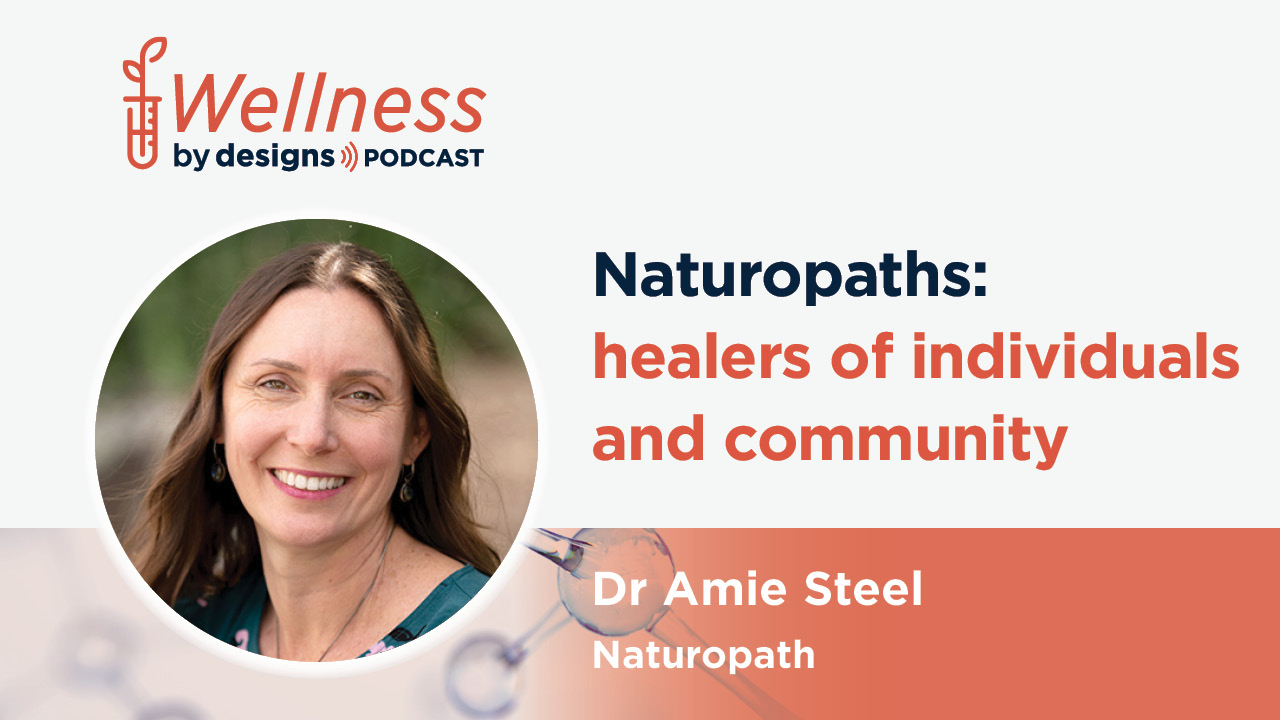

Naturopaths: Healers of Individuals and Community
Today we’re joined by Dr Amie Steel, a naturopath and researcher who dedicates her whole career to fostering the communication between research, clinical practice, and results.
Today, we’ll be discussing a fascinating topic of knowledge mobilization, and how the sharing of knowledge impacts not only other practitioners but the industry as a whole.
About Dr Steel:
Dr Amie Steel is a naturopath and Senior Research Fellow at the Australian Research Centre in Complementary and Integrative Medicine, University of Technology Sydney and is ranked Australia’s #1 Complementary Medicine researcher.
She holds editorial appointments for a number of journals, has authored over 250 peer-reviewed publications and edited three special journal issues and three research books. Her methodological interests encompass mixed methods research, implementation science, knowledge mobilisation, applied health services research, and practice-based (pragmatic) clinical research.
Connect with Dr Steel:
Dr Amie Steel Senior Research FellowAustralian Research Centre in Complementary and Integrative Medicine (ARCCIM)
Faculty of Health UTS
Email: Amie.steel@uts.edu.au
Transcript
Introduction
Andrew: This is “Wellness by Designs.” And I’m your host, Andrew Whitfield-Cook. Today we’re joined by Dr. Amie Steel, a naturopath who dedicates her whole career to fostering the communication between research, clinical practice, and results. And today, we’ll be discussing knowledge mobilization. So I’ll need an explanation of that first. Welcome to “Wellness by Designs,” Amie. How are you?
Dr. Steel: I’m great, Andrew. Thank you very much for having me.
Andrew: So, I guess we really do need to start off first, what the hell is research mobilization?
Dr. Steel: Knowledge mobilization is…it’s an offshoot of an area of research that’s called implementation science. So, I kind of need to go a little bit back in the family tree of knowledge mobilization to help make sense of it. So, it’s kind of born out of the evidence-based medicine movement, which, you know, was all about trying to get evidence into practice. And then the figures started to come out of that 15-year gap between when evidence was generated and when it actually was showing up in the realities of clinical care.
And so, this movement began of implementation science. And implementation science was about understanding social and behavioural economics and actually, what are the barriers to people implementing evidence into practice? And what do we do to actually helped to make that happen? And there’s a whole body of work now being done to actually start to look at how research evidence can be translated into practice and start to show up in clinical decision-making. So, that’s the forefathers to knowledge mobilization, but knowledge mobilization was a bridge off from that. And knowledge mobilization came from the view that actually, research evidence isn’t the only evidence or knowledge that has value. And there’s a lot to be gained from when you think about the evidence-based practice triad, you’ve got research evidence, clinician experience, and patient preference. That’s the standard triad.
And the implementation science was focused so much on bringing the research evidence in. It didn’t really take into account that the clinician experience was also a form of knowledge that everyone could benefit from, including researchers. And that the patient’s perspective, also is a form of knowledge that can really help to support clinicians in making better decisions but also in researches and conducting better research.
So, knowledge mobilization comes from the viewpoint that everyone actually has knowledge of value and that the best thing that we can possibly do for the outcome for everybody is to get that knowledge moving around so that everyone has access to other people’s knowledge, and then we get the best possible outcome out of it. So, that’s essentially what knowledge mobilization is, at a conceptual level.
Andrew: There’s a few things that you just tweaked in my mind there and one is about evidence-based medicine. And people are so caught up on the RCT as being the Holy Grail. And there’s a beautiful, it’s a very old paper now, and it was a sort of whimsical dig, if you like, at EBM. And it was a double-blind placebo-controlled trial on parachute use to avoid injury. You know, so who wants to be in the placebo arm of that one? So, the double-blind placebo RCT isn’t always the gold standard of what you want to do.
The other one that I thought about was you mentioned about knowledge. And I can still remember speaking to…and he was quite an orthodox doctor, he wasn’t naturally inclined at all. But he said, “Isn’t it interesting that there is still no agreed standard, if you like, of care for things like growing pains?” Indeed, we need to resort to what you’re talking about knowledge. So, this community knowledge, you know, hot water bottles and things like that.
Dr. Steel: It is really interesting. And one of the things that as I’ve been expanding into this space, is understanding some of the nuances of terminology becomes really important. So, the difference between knowledge and information, for example, information being facts, you know, knowledge being the application of those facts. So, in fact, evidence-based medicine is not about knowledge, it’s about information. Of course, knowledge can get documented as information, but there’s the real knowledge that happens in that clinical encounter. And that is all about the application and the context and those kinds of things.
And there’s a heap of work that’s being done in that space. And when I really started to understand what knowledge mobilization was all about, I thought, “Hang on, that’s what we do. That’s what naturopaths do.” And so, there were some really great opportunities for me to start to explore that, that came along, and I thought I’m really gonna make…I’m gonna open this right up for us and for the rest of the health community to understand our position in this a lot better than a lot of the assumptions that were being made. So, if I can give you the gaps of one of those studies…sorry.
Andrew: Yeah. You go.
Dr. Steel: Oh, no. I was just gonna give you an example of one of those studies. So, I was approached by the World Naturopathic Federation to produce some research for one of the bigger projects I was doing for them, the health technology assessment, which I can tell you about later if you like. But it was a large document that summarized basically everything we need to know about the naturopathic practice, profession, safety, effectiveness, the whole thing. But we realized that part of the story we needed to build into that was answering that question that people are often saying, is that naturopaths don’t use research evidence.
And so, I was approached by the WMF to develop a survey to help understand how much we do use research evidence in our clinical decisions. And my response to them was, “I can help prepare a survey that does that, I can conduct that study for you.” But I would just like to raise…I think we should take this from a knowledge mobilization viewpoint. We can absolutely include journals and conferences, and scientific studies as in the survey. But let’s broaden our lens, let’s actually better document how naturopaths are drawn and use other types of knowledge and information in their clinical decision-making. Because that’s actually a really unique element. And, in fact, we do it really well. And one of the things that came out of that survey is that we’re doing it in a way that knowledge mobilizers are considering almost the best practice in some ways.
Andrew: Absolutely. Amie, when you’re speaking about knowledge mobilization being sort of a new focus for you in your career. I think it’s really important that we take our audience back to your beginnings, and how you’ve gotten from clinical practice while studying to clinical practice to research, and now you’re furthering that career to help others, to help the naturopaths indeed around the world, not just in Australia. Can you take us through a brief journey of your career?
Dr. Steel: Sure. Potted history. So, yeah. So, I graduated as a naturopath, I was in clinical practice, and I was working as a rep for product companies doing some teaching. Clinical practice had a real mix of things that was going on. Then I went on, I did a master’s in public health. And that really changed my lens, not my philosophical approach in any way. In fact, there’s a very strong alignment between public health and naturopathic, but it helped me to see things from a bigger picture.
And it helped me to realize that in order for us to truly have the impact we wanna have in the community, we had to figure out how best to situate ourselves in the health system, and that there’s a lot of understanding of us as a profession and of practice. And that if we focus only on the treatments, the specific treatments, on, you know, the specific herbal medicines, the specific nutrients. And doing trials on those, then we’re gonna build evidence for things that other people will use, and naturopathy as a profession will become diminished.
So, my focus…and I absolutely believe that that other work needs to happen and it has incredible value. My personal focus and mission, though has been about understanding us as a profession and what we do as practitioners, and the contribution that we make. And the bigger picture of our clinical care that may or may not include those individual treatments, depending on the individual patient needs. But also, quite commonly includes a myriad of different things, and comes out from a very specific philosophical and principle-based practice approach. And so, that’s been my research focus up until this point in time.
So, after my master’s in public health, I did my Ph.D., just understanding how complementary medicine practitioners including naturopaths fit within maternity care in Australia. And then that has evolved from there and I’ve ended up with postdoctoral appointments, set up the office of research at Endeavor College of Natural Health. Moved on. I’m now situated specifically at UTS. So, I’ve been at UTS now for eight or nine years as a full-time research fellow. And in that time, I’ve been working very closely with the World Naturopathic Federation and other leading international and national complementary medicine professional bodies because of my focus on profession and practice, rather than on specific treatments. So, that background has taken me to identify the bits that we really need to…the gaps we really need to fill so we can clearly articulate what value we offer in the health system.
Andrew: Yeah. Okay. So, let’s go back to the topic then, about fostering knowledge and the dissemination of that. Why is it so important to foster research in this area? I mean, I think it’s a pretty obvious answer, we’re being attacked left, right and centre. But it seems to me that despite, you know, let’s say, 15, 20 years of naturopathic research in this area, looking at practice, that we’re still under attack. And this is something that I just don’t get, particularly when it’s sort of like, the camps that are attacking us, let’s say they haven’t got their own garden in order yet. They’re very well known what was it “BMJ” Atlanta, or “New England Journal of Medicine” that looked at the amount of orthodox medicine, which was actually evidence-based. And it wasn’t great. It goes something like 15%. So, you know, there are still things that are done commonly that don’t carry the weight of evidence, and yet they’re blaming naturopaths for doing exactly that.
Dr. Steel: Well, I guess I step away a bit from the attacks and just like what I’ve done with this particular survey, which was essentially responding to an attack. And I’ve focused on playing to our strengths. And so, I think that there is a lot that naturopathy can and does do that is of incredible value. And as we mature as a profession, there’s also things that we can constantly reflect back on and build on and do better in all areas, for sure. But I’ve just stopped engaging with the critics. I’ve stopped thinking about the critics, I’ve focused in on the profession, and I’ve focused on what it is that if we put the critics aside, we look at what the policymakers are trying to achieve for the health system, we’re looking at what the community is asking for in the health system, and I’m looking at what we as a profession can and do offer. And then I’m just focusing on finding answers to all of those things.
So, as an example of how that’s evolved in, I think 2017 or maybe 2016, there was a standing commission on looking at the role of primary care and chronic illness management. And so, they’re calling out for submissions. And they had like a structure or a framework priorities for this call for submissions that was all about the different elements that identified we’re gonna be important for primary care and chronic illness and asking us to respond to these. Asking anyone who wanted to respond to these things.
So, I worked with one of my colleagues on behalf of NHAA to put a submission into the government. And one of the areas that’s a really big priority area at a policy level for chronic illness is patient-centred care. And so, that seems like a no-brainer for us as a profession. That, of course, that’s one of our core philosophies, our core principles, I should say, and philosophies for that matter. And when I went to write that section, I realized I didn’t have any evidence of that. We have our principles I could link back to but I didn’t actually have any evidence that we were doing it.
And so, I proposed a project for an honours student to do that work. And I had someone who agreed to take that on hopefully, and she did that for her honours. We did a very small project looking at the experience of patient-centred care experience of patients who visited naturopaths and a few other health care professions as well. That showed very clear results. It was a validated instrument that is used for this particular type of research. And so, she went on to do a Ph.D. and she took a bigger project and the initial project she did was just running was one of the student’s clinics in the college. Her Ph.D. project was one running community clinics in complementary medicine professions around the country. And it included chronic illness patient-centred care instruments as well as the complementary medicine once we use for her Ph.D.
That data has now got very clear, we’ve got four or five papers that now very clearly show that not only are naturopaths…all of the care and professions, they’re most patient-centred. They are also patients who consulted with a naturopath and a GP write their naturopath is more patient-centred than their GP. And that the patients who, although the more patient-centred patient experiences their care practitioner to be, the more likely they are to disclose their use of complementary medicines or conventional medicine. We’ve got all this data around that now that we can take to the government and say, “You want patient-centred care? We’re delivering it. We’re delivering it better than anybody else in the health system is delivering it. And we’re delivering it to patients with chronic illnesses. And it’s a safer outcome because they’re more likely to tell us what medications they’re using. It’s a beneficial outcome.”
And so, I’ve moved away from paying attention to the detractors because to be perfectly honest, for a lot of those people, they are not science-based in their attacks because their attacks are not based on their own evidence. And so, I just don’t see the point in engaging with those people, I’m focusing on what are the solutions that the government are looking for, and which of those solutions are we actually the solution to? And building up that evidence, we can make a compelling argument.
Andrew: Yeah. A couple of things you said there about patient-centred care. And, you know, it really does seem that orthodox medicine, at least in Australia, that’s all I can speak of is, can’t be focused on patient-centred care because it is too focused on time. And there’s a time, money care triad that has to happen there. One has to lose out all the time. So, anyway. So, there was a very interesting article written by a GP who actually tried to address this time versus care conundrum. And she decided to ask every patient that day, is there anything else? Is there anything else? Is there anything else? And when she timed it, each consult was only two minutes longer. Now, add that up over a week, and you do have a significant time. But for each patient, that could be anything from liking your GP to life-saving in the information that you glean from that extra question. And this indeed, is what you say is that one of the reasons people like to see naturopaths is because they feel they’re being heard.
Dr. Steel: Yep. One of the other things that came out of that study, though, which kind of links back to this idea of knowledge mobilization is that they felt empowered. They were given information that they could then use to look after themselves, and identify when they needed extra care. And they actually came away with a sense of empowerment that they had some control and influence in their own health outcomes. And that part of that was again, coming back to our principles, our focus on Dr. Oz’s teacher that we are all about educating people and giving them the information they need to look after themselves.
Andrew: So, what sort of topics specifically are we talking about with regards to knowledge mobilization? There’s a few things that spring to mind with me, and that is things like vitamin D, the importance of Vitamin D. Vitamin K2 as opposed to vitamin K being a single entity. Fish and fish oil, you know, the work by Dyson was basically championed by natural medicine. And laughter, by orthodox medicine until the GCEP and the GCIHF trials and the dark trial and things like that, which are massive trials piggybacked on to usually statin or other heart medication parameters, sorry. But also things like looking further into cholesterol. Actually, I should catch myself there, looking further into lipoproteins, not cholesterol, because we could get caught up on an erroneous term, things like that. So, what other topics are you sort of championing here?
Dr. Steel: Well, my kind of the researcher brain of me and so, well, we just need to…and all of these things that you’ve just said are all true. And we don’t have any empirical information about that. We don’t actually have…there needs to be better documented. And so the survey that we did of…another survey that we ran, in addition to the knowledge mobilization survey, is one on the community education and health promotion activities that naturopaths undertook. And the sorts of topics that they were talking about were about just how to prevent illness, how to self-care, how to manage health complaints. At a very high-level topic kind of eras, about the naturopathic principles and approach, those kinds of things.
And so, I think because we are so individualized, all of those topics that you mentioned are absolutely likely to be in the mix, but they will vary incompletely depending on the individual patient that’s in there. But the different… kind of separate to that because the sort of work you’re talking about is also their contribution to building new knowledge. So, one of my Ph.D. students at the moment is looking at how different forms of folate and changing the form of folate can actually have real differences, particularly within women with MTHFR polymorphisms who have had recurrent pregnancy loss.
So, this is actually gonna be a really confronting conversation for the public health community. It’s challenging, very established, very accepted norms around folic acid fortification and supplementation and all sorts of things. It’s a very brave step to be taking in a public health space to be doing it. But it’s important work and her honours research has indicated that there is justification for that work to happen. And so, I’m supporting her as a supervisor to actually make sure that we build the argument in such a robust way that people might find that confronting, but they can’t dismiss it out of hand. And so, you know, there’s all this…sorry.
Andrew: Indeed, it was confronting to me because I was one of that old guard that just thought, “Well, you know, we’ve always used folic acid, what’s the problem?” No. Caroline really opened my eyes and slapped me around the face a little bit about this unmetabolized folic acid. This is such an interesting area. It’s not a countering of that, but there’s also things that we need to change in our own vernacular and leave behind because we’ve got them wrong. There was a nice term, for instance, called leaky gut syndrome. And, again, one of your colleagues, Brad Leech, has basically diss that it’s not a syndrome, it’s kind of like saying you’ve got a pain syndrome. No. You’ve got pain, you’ve got leaky gut or hyperpermeability. But permeability happens all the time, it’s normal. So, he’s really sort of fine-tuning what we should be saying is our vernacular, rather than these nice terms that were made up.
The other one that I was thinking about was…oh, the concept about folic acid with cardiovascular disease. Great for prevention and possibly very good to stop ongoing damage. But the damage that has already happened can’t reverse. It’s kind of like, I think this was unstable, stable or unstable angina. And what they were talking about was that giving more folic acid in these patients doesn’t help. It’s kind of like asking a folic acid supplement to heal a cleft palate in a baby that’s been born that way they’ve already got the neural tube defect. The hose is bolted in that instance. So, it can be, as you say, confronting to both sides, if you like, but what I’m [inaudble 00:23:05] about is…yeah, you go. Sorry.
Dr. Steel: No. I was gonna say what other things that come from that then is that…on that topic of clarifying the vernacular, the research centre that I’m a part of that we run a leadership program for an international naturopathic leadership program for researchers. And so, there’s 12…the leading naturopathic researchers, we bring them together when we’re not in a pandemic once a year, and we do a lot of collaborations and things like that.
So, one of the fellows is Dr. Ryan Bradley from the National University of Natural Medicine in Portland, and the Helfgott Research Institute. And so, he led a paper with other fellows from that program on naturopathy as a disruptive innovation in health care. And one of the kind of really great points that he was making in that is that we are early adopters. We take on this new knowledge, the lipid-protein research, the folic acid research, the leaky gut research. As soon as this stuff is coming out, we’re paying attention. And we’re starting to think about what does this mean for our patients, and how do we apply it? Which is really great. It’s a really great characteristic of our profession. But we also need to be aware that because this knowledge or this evidence is still emerging, we have to be very ready to adapt and modify our practices and our approaches when what we thought we first understood when that first bit of information came out becomes clarified with more research and more evidence. And so, it is a case of us being open to being flexible around that new knowledge because, you know, we are early adopters of research evidence. We do take things on. It doesn’t take 15 years for research to get into naturopathic practice at all. You know, we can be really quite proactive in terms of applying new evidence as it arises.
Andrew: You know, detractors I know you don’t engage with them anymore. That’s great. But detractors of natural medicine will often say, “Yeah, but sometimes you jump the gun with evidence,” like, for instance, that, you know, folic acid with cardiovascular disease. And they go, “See, it didn’t work, it didn’t pan out. So, hang on.” What about FOLFOX? What about thalidomide? You know, what about arthroscopy, knee arthroscopy? So, there’s all of these…they’re not just drugs. So, you can’t just blame the pharmaceutical industry, there are interventions. There are medical interventions that they were accepted. What was the other one? Paracetamol for lower back pain. How many decades was that in the guidelines for? And now it’s not. So, the world turns. I just think it’s really interesting that…
Dr. Steel: It really does.
Andrew: …there are so many people… Yeah. Really ready and willing to heat blame upon natural medicine without keeping their own house in order first. I was gonna ask you…Oh, that’s right. Forgive me, I was kind of just put this in because this is really interesting to me about the journey that orthodox medicine that’s been the sort of toing and froing all the time with vitamin E. I can still remember the journey about oh, it’s got to be natural vitamin D, the D-alpha-Tocopherol can’t be the DL. And then it was blaming the DLs. But then there was also this smouldering side bit of research that is now coming to the fore about the tocotrienols, possibly being probably the major active component. And the problem was that we left them behind when we purified it too much. So, now we’re sort of swapping over to the tocotrienols rather than the tocopherols. It’s really interesting how the world turns.
Dr. Steel: It is and that really reminds me, though, that one of the things that when we’ve gotten naturopaths doing that research. Because you’re saying that we were doing this, we were doing that. It wasn’t actually naturopaths doing any of that research, that refined Vitamin E research. And that’s actually not how naturopaths practice or think. And what we found when we started bringing together for the health technology assessment, all of the clinical research that’s been conducted by naturopaths there’s over 300 studies. There was hardly any that was just one intervention, hardly any.
Most of them had…even if it was a herbal formula they had two or three herbs in it. If it was a vitamin for me, it would be three or four vitamins. Very commonly, you would have two or three things like you have some herbs and some vitamins and maybe some lifestyle or hydrotherapy intervention. They’re really quite…we’ve practiced in complex ways, we think in complex ways, and we research in complex ways. And I would say that if a naturopath had started asking questions about vitamin A, we would never even have the problem that arose because we would never have taken that approach of refining it down to a natural versus synthetic and getting into the nitty gritty of all of that.
Now, I fully believe that mechanistic research is incredibly valuable because it helps us to know how what we are using works. But in terms of clinical interventions, just using one intervention, we know that that’s not how the human body works. And, in fact, one of my other Ph.D. students, Kim Graham, is doing some amazing work on complexity science. And looking at how naturopaths think in that incredibly complex ways and that the human system is a complex adaptive system, it’s not a reductionist system.
And again, this is not rocket science from a naturopath’s point of view, we know this. That’s just how we think that there is now good scientific, rigorous methods that are being used in ecology research and internet research and all sorts of things that she’s bringing across into health as a way of actually helping to understand how we can think about these things. They started using some of that in Chinese herbal medicine research. They’re using network meta-analysis where they’re starting to look at the herbs that are most commonly coming together in these original formulas and trying to get an idea of like the most ideal mix of herbal medicines, and they’re using it from that point of view.
But I think taking that step back again, which is the work that Kim’s doing and saying, we need to think about this not just in terms of the intervention but of the human body. And so, if someone presents in the case that she’s using for her Ph.D., she has just written up her first paper on this. If the case presents is someone with obesity, then we are very conscious that obesity is not just about diet, we’re looking at hormones, we’re looking at mental health, we’re looking at inflammatory markers, we’re looking at all sorts of factors that play into that. And so, if you’re treating someone with obesity, you’re not just gonna give them chromium. It’s just not how this is gonna roll for any naturopathic intervention, you’re gonna look at all of those things and try and support them on all of those levels. And I think that complexity is one of the things that has led people to think that the ICT model doesn’t work for naturopathy, but that’s a separate conversation.
Andrew: I’ve got to say I’m so impressed with the way that your mind is thinking about the complications and the nuances of caring for a patient, not just delivering uphill. And I do feel and I know I seem to be doctor slapping at the moment. But it does seem to me that more and more, there seems to be this one pill approach or one therapy approach for a condition rather than the older doctor. Forgive me otherwise, I love his name, Dr. Winkworth. I mean, it’s just a cracker when I was a kid. And Dr. Winkworth would never just give one pill, he’d always say there’s the hot water bottle, the compress. And there’s, you know, the warm shower for a fever.
And all of these very simple home remedies, if you like, were not harmful. And they may aid in helping the major therapy that he was prescribing, so whether that be antibiotics, or a pain medication, whatever. But to me, he always…I don’t know why he’s always stuck in my mind, but he fostered what medicine was about, was truly about. And it just seems that naturopaths have taken this because they’ve remembered the old ways. So, they’ve actually taken this and remembered that it’s care. Care is not one pill, one thing, but it’s a whole host of things, which we’re talking about. And oftentimes, the dissemination of knowledge, as you say so that patients can be empowered to look after themselves. Who would have thunk?
Dr. Steel: Well, I think one of the things as well is that in…it’s almost become so far down that track for doctors that I’m thinking that’s gonna be really hard, not impossible, but really hard. Because now when you talk about multiple treatments in medical care, the first thing that we’re gonna talk about is polypharmacy. So, if it’s not one pill, it must be three or four pills. You know, and it’s not that other mix. And that creates all sorts of problems. So, rather than seeing it as you know, it’s just it’s complicated. The human body is complicated. And the patients who show up in clinic are living in a complicated world. And everything that we do needs to kind of hit them on multiple levels and support them in numerous ways. And that takes a certain way of thinking. You have to hold a lot in your brain when you’re providing care to people in those situations. And absolutely the supplements and herbal medicines are really important. And equally important is the diet and the lifestyle.
And the research that we’ve done for the World Naturopathic Federation is internationally, herb dietary interventions and lifestyle prescriptions are the two most common therapeutic interventions that naturopaths are using, followed by herbal medicine and nutritional supplements. But dietary interventions and lifestyle change are the two most common things. So, they are the cornerstone of naturopathic practice that are very well supported by herbal and nutritional medicine. But herbal and nutritional medicines are not as prominent in any at all.
Andrew: The good naturopath is always mindful that supplements are not medicaments, the medicaments are diet, lifestyle, exercise, mindfulness, blah, blah, blah. Just on that polypharmacy, you know, I’m gonna do it again and I have to because it’s true it happens so often. How many times and forgive our audience overseas, but in Australia, there’s this set up where if a pensioner pays for, I think it’s 52 scripts. By the end of 52 prescriptions, then you get on what’s called the free list for that year, and then your prescriptions are given to you at a much cheaper rate if any charge at all.
So, I can still remember when I worked in pharmacy that a woman reached the free list by the end of February. That is 26 prescriptions per month, and she had her prescriptions in a long Tupperware cake box, a long thin one with handles. I’ll always remember it. It was like a, you know, the sort of Christmas cake thing. And when I looked at it, several of the subsequent medications were designed to alleviate a side effect of previous medication. And despite the chagrin of her treating doctor, I implored this patient to go and see a physician. Dr. Quinn, if you’re out there, I honour you, sir. This doctor put her into a hospital, she came out a week later on four prescriptions. Polypharmacy anyone?
Dr. Steel: Yeah. I can remember when I was in clinical practice, we get complex patients too. We’re not getting the patients who’ve just got recurrent colds or actually, we do get patients who’ve got recurrent colds as well. But there are patients who’ve got allergies and heartburn and insomnia, and all these things are quite likely interrelated. But patients are still coming at it from the perspective… We’re treating this now, but what about that, and what about this?
And so, it takes a certain amount of skill as a clinician to help the patient navigate their way through not fixing everything at once. And there’s a lot of education that comes with that as well. And that’s coming back to that idea of us as knowledge mobilizers and educators. And empowering patients to better understand their own health is to help them understand that yes, I understand that still a problem, but we really need to focus on this first. And if I give you these things for that, you’re now gonna be taking six different things. And that’s actually quite a lot to be taking all at once. And we’re not really gonna know which one’s working.
And there’s also a lot of extra time. That takes time to counsel your patients through those expectations, particularly if they’re like, “I would prefer to take something than to change my diet.” And, you know, there’s again, that education support counselling addressing that from a motivational counselling point of view. There’s a lot of change that’s…a lot of extra work for us. Whereas prescribing something extra isn’t extra work for us in that way. And so, I can understand how those things come about, but I don’t think they should. I just understand how they could. So, yeah.
Andrew: I mean, there’s so much more to discuss here. It’s a huge topic, but something that we can learn something from as we move forward, you know, from your research and your colleagues as well. And forgive my audience for sort of doctor slamming, but I cannot ignore it as you do, Amie, and you just move forward and concentrate on what you’re good at. But I cannot ignore this inequity when we’re talking about patient care, you know, that naturopaths are delivering. And they’re being detracted from and attacked by certain facets. And I do apologize to the doctors, particularly my GP who is quite orthodox, and she’s a brilliant GP, she’s a true doctor. So, please accept my apology for the doctor slamming I gave. But I think it’s an important sort of topic to discuss if we’re gonna be really honest with ourselves. Amie Steel, thank you so much for sharing this today.
Dr. Steel: That’s okay. I understand, and I know some awesome GPs as well. And you know, on that thing of patient experiences as well, I just wanna bring back that last point. If you don’t mind me having one last point is that patients…going back to the evidence-based medicine triad that we started with, that triad starts with patient preferences. And one of the things that we found from our research is naturopaths aren’t just using patient preferences to inform their clinical care, which is essentially, “I don’t like liquid, can I have it in a tablet form?”
When we focus on…we actually use patient experiences and listen to those experiences of their health as a form of knowledge. And we value that, and that is not showing up in other areas of the health system. We will take that patient’s telling of, “I find that when I eat this type of food before bed, I have really poor sleep.” We don’t dismiss that, we actually genuinely engage with it, take it on board, and consider it in our larger clinical understanding of their case. We value patient experiences and understandings of their own health.
And that’s also part of what makes us amazing knowledge mobilizers. We listen to the research, we listen to our patients, we share our own clinical experience and knowledge, we bring all of that information together, we share it back with the patients, and we share it back with the community. We are incredibly important and synthesizing and sharing the health information out there. And that’s one of our strengths that we really need to be really proud of because it’s something that helps us kind of figure out how to do and we can just show them how we do it.
Andrew: Well done, Dr. Amie Steel. Thank you so much for sharing this. You are obviously… I mean, it just shines from you how you are dedicated, not just to your colleagues in helping the profession reach the heights that it really should be honoured with if you like. I’m saying that word too much, but that we’ve really earned our stripes but also the care that this means for patients by your colleagues delivering excellent care to them. Thank you so much for joining us on “Wellness by Designs” today.
Dr. Steel: Thanks, Andrew.
Andrew: And thank you for joining us. Remember you can catch up on all the other podcasts and the show notes for this podcast on the Designs for Health website. I’m Andrew Whitfield-Cook. This is “Wellness by Designs.”



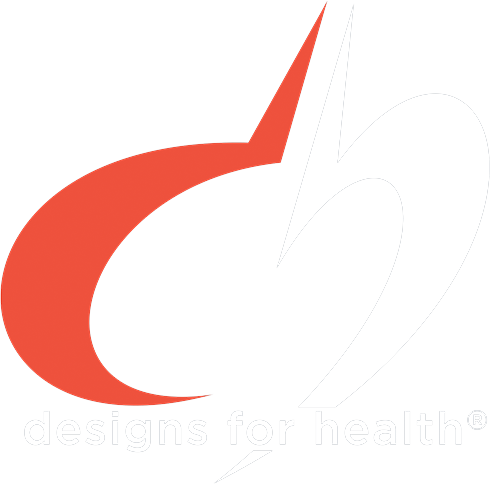


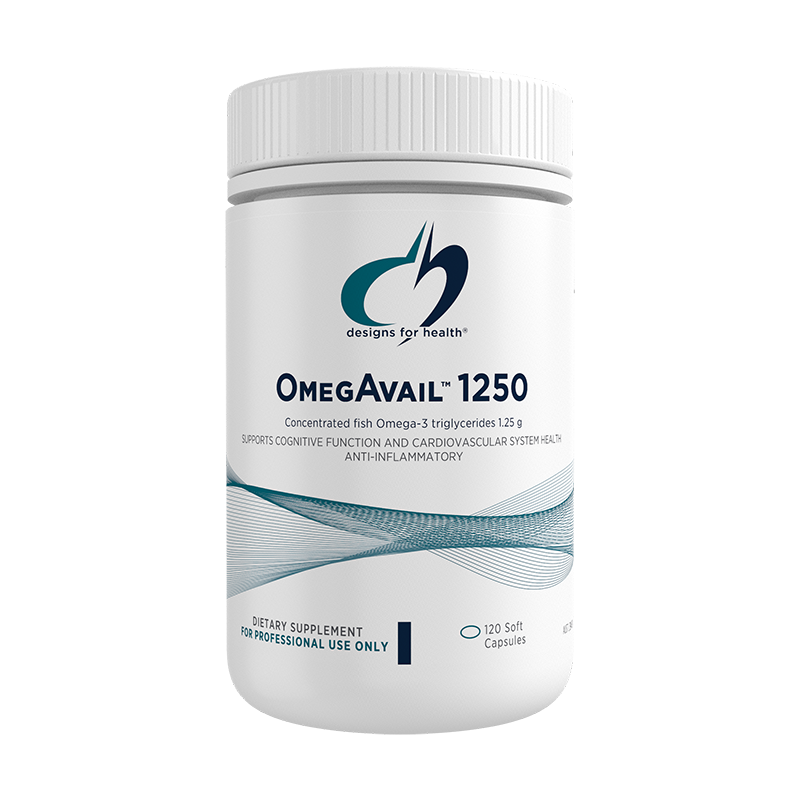
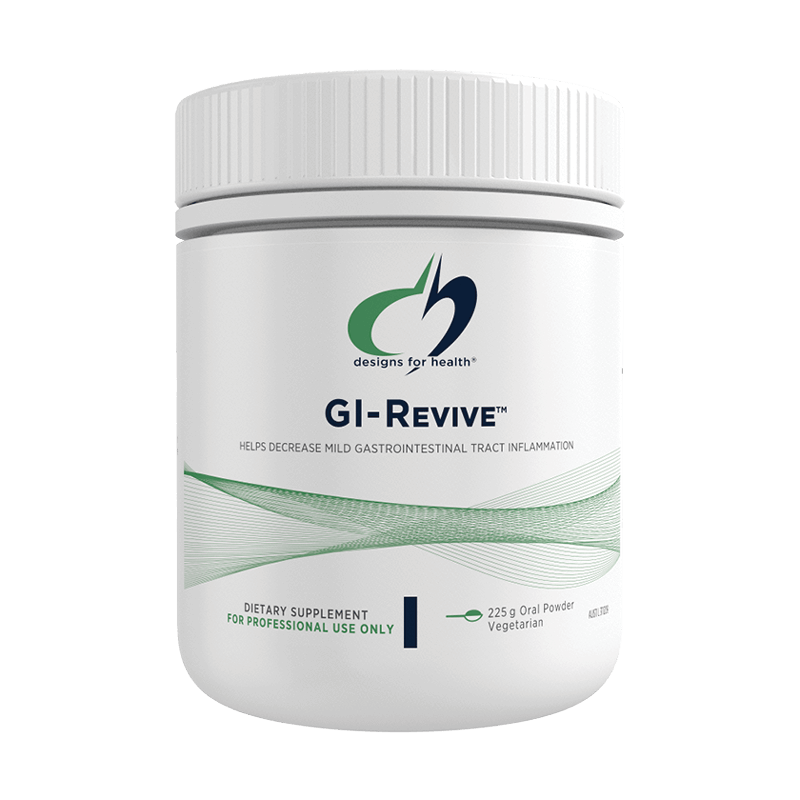
 Essential Insights into Gallbladder Function and Care with Amie Skilton
Essential Insights into Gallbladder Function and Care with Amie Skilton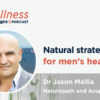 Natural Strategies for Men’s Health with Naturopath Jason Mallia
Natural Strategies for Men’s Health with Naturopath Jason Mallia Exploring Extemporaneous Compounding with Diana Boot
Exploring Extemporaneous Compounding with Diana Boot